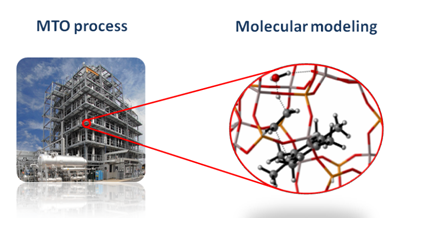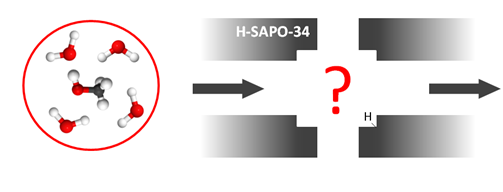Impact of a mixed water methanol feed on olefin formation during the MTO process
Impact of a mixed water methanol feed on olefin formation during the MTO process
Promotor(en): V. Van Speybroeck /15_NANO08 / Nanoporous materialsDepletion of oil reserves and the resulting high oil prices initiated the quest for alternative processes to produce hydrocarbons. Within this respect the Methanol to Hydrocarbon (MTH) process in which a methanol source, originating from from natural gas, biomass or coal, can be converted into hydrocarbons using zeolite cataysts. Zeolites are today’s workhorses of petrochemical industry due to their favorable size selective channel and cage systems which makes them tractable to tune the selectivity of various processes.
H-SAPO-34 is an ideal MTO catalyst due to its high selectivity towards light alkenes like ethene and propene. Accordingly it is used in various industrial setups for the Methanol to Olefins (MTO) process. Today there is a general consensus that the MTO catalyst has a supramolecular nature in which both the inorganic framework with its acid site and aromatic hydrocarbons catalyze the reactions. At real operating conditions, various catalytic cycles operate simultaneously during olefin formation, resulting in a very complex reaction mechanism which is currently still not fully understood. Herein, molecular simulations are an indispensable tool as they can provide molecular-level insights (Figure 1).

Figure 1: Molecular simulations are a molecular microscope for complex industrial processes.During methanol conversion, protic molecular like methanol and water are ubiquitous. Water is often present in the methanol feed or can be added on purpose to tune the catalyst stability and product selectivity. Currently, the number of studies that thoroughly explain the effects of water on the MTO process are rather scarce.

Figure 2: Influence of co-feeding methanol-water mixtures in H-SAPO-34 on the MTO chemistry is currently not fully understood.Goal In this thesis proposal we wish to investigate the influence of a mixed water/methanol feed on the importance of crucial reaction steps in the MTO process. Reactions under investigation encompass steps where protic molecules may act as assisting species to stabilize various intermediates or transition states. Furthermore experimental insights have shown that some reactions are more or less promoted by varying the methanol feed in terms of adding water but also in terms of changing partial pressures. Simulation of such effects however requires the application of more advanced molecular simulation techniques, which rely on first principle molecular dynamics simulations. The research will be performed in the framework of a larger concerted action to simulate chemical transformations at operating conditions. The Center for Molecular Modeling has build up vast expertise in these advanced simulation techniques and collaborates on the subject with leading experimental and theoretical partners. It is the intention to involve the student actively in the work discussions with our collaborators. The CMM has access to sufficient computational resources to execute this research project.
The proposed topic is challenging and requires technical skills, creativity and chemical insight. Furthermore there will be a close interaction with the researchers working on spectroscopy in nanoporous materials (headed by Prof. K. Hemelsoet).
- Study programmeMaster of Science in Chemical Engineering [EMCHEM], Master of Science in Chemistry [CMCHEM]KeywordsHeterogeneous Catalysis, Chemical kinetics, Computational applications


